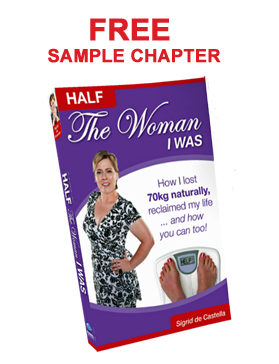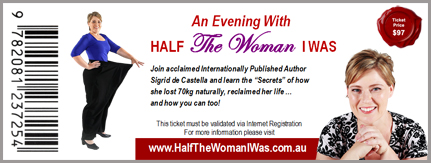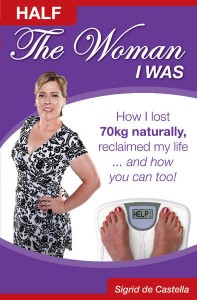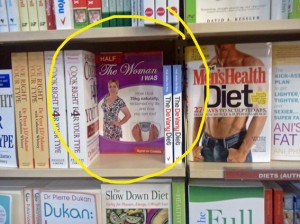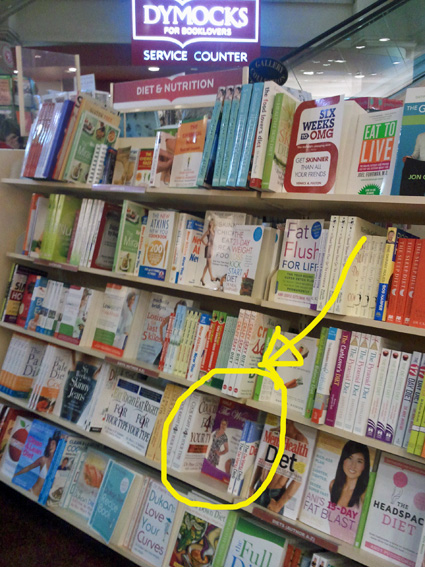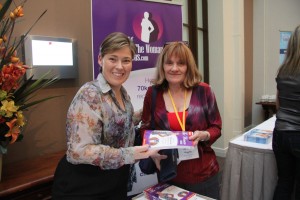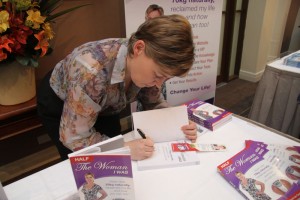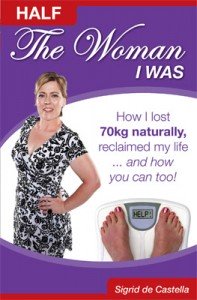 New Melbourne author Sigrid de Castella believes she has unlocked the secret to long term weight loss and mapped the way through the mental and physical battle with her new book “Half the Woman I Was”.
New Melbourne author Sigrid de Castella believes she has unlocked the secret to long term weight loss and mapped the way through the mental and physical battle with her new book “Half the Woman I Was”.
The book is the first from de Castella who promises more after the gratifying experience of penning her success in changing her life for the better.
de Castella decided to write the book following more than 30 years of battling with her weight before deciding to take her life in her own hands. Upon commencing her journey, de Castella believed there was likely thousands of other out there also wanting to commence the battle.
Wanting to help ease the pain of their struggle too, de Castella started her honest book in the hope it would inspire others to take the journey.
de Castella explains, “I grew up an obese child in a family of athletes. Running marathons was something that most of my family did regularly – or had done. Health and fitness was something that was valued incredibly highly, particularly as my uncle was an advocate of Pritikin. As a result always felt out of place in my family and, as I grew older and my weight increased, I felt more alienated, like I had been dropped into someone else’s family of fitness freaks.”
“As if being a fat child wasn’t painful enough with all the teasing and name calling from the other kids, being a fatter adult was even worse. Having a famous surname synonymous with health and fitness, I was shamed almost every day as people who were introduced to me or saw the name on my credit card asked me if I was related to the Commonwealth Games Gold medalist. After replying in the affirmative I often felt their eyes gaze me up and down and silently ask the painful question “so why are you so fat?”
“It was not until I was 34 years old and weighing in at more than 143kg that I hit the wall and the answer to my lifelong problem revealed itself. It was only when I was ready, and willing to see, that the fog lifted and the ‘Secret’ was exposed. The solution was so fundamentally logical and technically brilliant that I couldn’t believe no one had told me about it before.”
“First and foremost what I had to understand was that no one could help me until I was ready to help myself. No matter how many people I asked for help, nothing was going to change until I was ready for the journey that would take me from obesity to health and vitality. That journey of 20 months in which I shed more than half of my body weight was done safely, naturally and without surgery. By gaining health and vitality I slashed years off my body age and added many more years to my life expectancy. I went from a size 30 to a size 10 and my feet shrank three full shoe sizes.”
“Half the Woman I Was” is the ultimate distillation of all Sigrid de Castella learned in her personal journey from morbid obesity to health and vitality.
de Castella adds, “I was asked to write this book after many people who saw my transformation asked me what the ‘secret’ was. The ‘secret’ is a holistic experience through self-education, knowledge and wisdom.”
Interview with Sigrid de Castella
Question: What originally inspired you to begin losing weight?
Sigrid de Castella: I had been trying for most of my life to lose weight and I couldn’t understand why I was different and I had become really angry and upset about my situation. I’d grown up with the belief that I’d been born with the world’s worst metabolism and there was nothing I could do to change it. I happened to see the first season of America’s Biggest Loser and I saw these really big people, who were just like me, starting to lose the weight and change their lives, I started to wonder why I was different and why I couldn’t do it. I began doing research, started making small incremental changes and learning a lot and I realised I could do it!
Question: Why did you want to write about your experience, in a book?
Sigrid de Castella: I’ve written for many, many years and I’d always kept a journal and as I was going along I had a lot of people who saw me losing the weight, every week I’d lose more and more and more and because I’d been so big, for so long a lot of people came to me and asked ‘What are you doing?’ Then, I’d have dismayed people come to me and say ‘I’m having so much trouble losing weight’ which made me think that my story could inspire other people to go on a similar journey and really reclaim their lives back and change their lives to have everything that they ever wanted.
Question: How did you begin losing weight?
Sigrid de Castella: The first things I did was:
Really analyse what I was eating and get a better education about food values and calorie density which is something that a lot of people don’t talk about; 100g of celery has a vastly different calorie density to 100g of chocolate.
I have hereditary lymphedema which is swelling of the lymph gland which is quiet a painful condition, I am only a level one which is fairly mild but still incredibly painful and having all the weight on exasperated that condition so much that it was painful to walk. I saw others outside doing exercise and I really wanted to get outside and do something; I started walking around the block and gradually increased my exercise and didn’t do anything terribly strenuous because it was about moving more.
I also began drinking a lot more water because I didn’t drink a lot of water.
What I discovered by making those three small changes (changing diet, increasing my water consumption drastically and moving that little bit more) was that I started getting pain relief from my condition and that enabled me to feel motivated to continue down that track and continue to make changes.
Question: Can you talk about what the ‘secret’ is?
Sigrid de Castella: I talk about the secret a lot and I refer to it as the ‘secret’ because it is hard to sum up, briefly. When I was asked ‘what is the secret?’ at first I answered ‘diet and exercise’ but it’s really not about diet and exercise; there are over 2,300 weight loss companies in Australia and they all promote diet and exercise – if they all worked, Australia wouldn’t be the fattest country in the world with over 75% of the population overweight or obese. It’s not just about diet and exercise – they are important yes, but it’s not the main part.
For my program the main thing is about 50% getting your head right which includes clearing that mental baggage that is preventing you from actually believing that you can lose weight and you can do it. We were all called things, growing up as kids and we’re scolded for getting something wrong and told ‘you’re stupid’ and you actually start to believe it; over the years with a lot of name calling from kids such as ‘you’re fat’ I believed that I was always going to be like that. I had to start peeling back those layers and understanding the programs that my subconscious was running that were making me believe that was going to be my only reality.
It’s 50% about getting your mind right, 35% about understanding food and only about 15% exercise. People think that when they go on a weight loss program that its majority exercise and that they have to spend hours and hours in the gym and it’s really not about that at all. People place far too much emphasis on exercise and not enough on getting their head in the right place.
Question: How did being overweight affect your life?
Sigrid de Castella: I was still very successful in my career although I didn’t have as much confidence as I have now and I wasn’t as happy. I was always a fairly happy person and when I say I am much happier now people, who had known me all that time, were quite surprised because I was always very happy; I was happy on the outside but not on the inside. I feel there is a much better alignment between who I really am inward and outward.
Everything was difficult when I was bigger. Getting clothes was really difficult especially getting proper business attire and looking right. I didn’t like the way I looked and moving was really difficult and I would always try and find the closest carpark to wherever I had to go because I didn’t want to walk. It was difficult to get everything done in a day; there was a lot of struggle.
Question: What advice do you have for other women who want to begin losing weight?
Sigrid de Castella: Other than buying the book (laughing)! Start doing some inward exploration and start analysing why you are the way you are. You’re not really going to change your life, until you’re ready to change your life and that’s the biggest thing because it didn’t matter how many people tried to help me when I was bigger, it wasn’t until I got to the point where I wanted to change that I could do it. I needed to see it was possible to begin.
It’s easy to say to someone join a specific health program, stop eating or join the gym but until you understand why you want to do it all you are not going to be able to change your behaviour. It is a big and confronting topic for most people to understand why they are doing the things that they are doing but it is the most pivotal question you need to ask yourself.
Question: Do you recommend calorie counting or calorie awareness?
Sigrid de Castella: It depends! In my book I talk about calorie counting (manual or a computer program) as a sort of a lifejacket because if you’re an overeater you’re able to use calorie counting as a lifejacket to re-educate yourself about what you should be eating. If you’re an overeater and you don’t understand food values then yes, calorie counting or getting calorie controlled home delivered meals for a period of time is a very beneficial method of re-educating yourself about what you should be eating.
Having said that, I don’t agree with a lot of the pre-packaged meals that are delivered to homes because I feel their emphasis is on the wrong types of components and they are too carbohydrate-heavy. It is most beneficial if you can learn to cook and eat the right meals and then you won’t have to count calories, I don’t count calories now.
Before I started I was obviously eating all the wrong foods, I ate a very high fat, high sugar, high carbohydrate diet because it tasted really good although they are not good for you and they don’t provide the level of nutrition that you need to sustain your body and have it performing at an optimal level. When you eat a diet high in vegetables, complex carbohydrates and lean protein your body gets all the nutrients (particularly if you are eating organic or biodynamic) that provide nourishment so you don’t have to take a multi-vitamin which isn’t as effective as getting the actual vitamins, minerals and trace elements out of real food.
Interview by Brooke Hunter
To read the original article click here
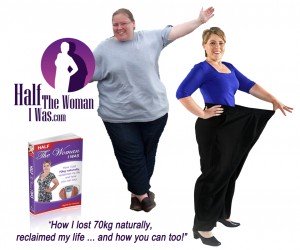 Women with Polycystic Ovary Syndrome (PCOS) face a daunting array of health and medical issues as well as life-changing emotional issues which often lead to depression and weight gain. And it’s in this very battle of the bulge that Melbourne author and weight loss authority Sigrid de Castella wants to help.
Women with Polycystic Ovary Syndrome (PCOS) face a daunting array of health and medical issues as well as life-changing emotional issues which often lead to depression and weight gain. And it’s in this very battle of the bulge that Melbourne author and weight loss authority Sigrid de Castella wants to help.


